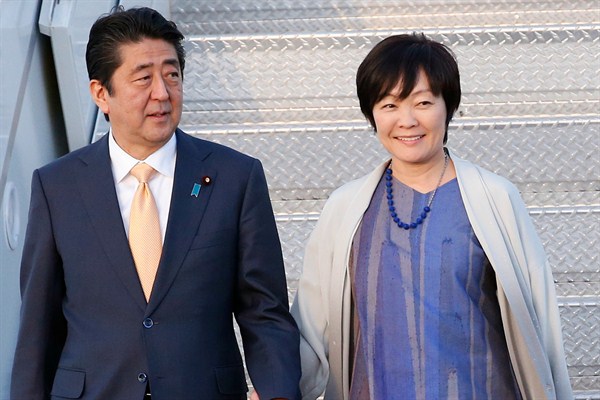A political storm is brewing in Tokyo over revelations last month that officials permitted the sale of government-owned land at a much-reduced price to a right-wing nationalist school group, Moritomo Gakuen. The head of the foundation, Yasunori Kagoike, was allowed to purchase the two-acre plot of land in Osaka for about $1.2 million—a figure far below its assessed value of approximately $8.3 million. The scandal has since snowballed with the release of information that Prime Minister Shinzo Abe’s wife, Akie Abe, was an honorary principal of the planned elementary school in Osaka and allegations that she donated 1 million yen—about $8,800—to the foundation.
Opposition parties in Japan have seized the moment to launch a political assault on Abe’s ruling party. They summoned Kagoike earlier this month to testify on any connections between the Abe government and the land purchase. During his sworn testimony, Kagoike acknowledged that he received the 1 million yen donation from Akie Abe with the message that it was on behalf of her husband. Officials in the Ministry of Finance have tried to explain the bargain basement pricing of the land sale as a result of the significant clean-up work that was required before it could be usable. However, those arguments have done little to appease opposition members in Japan’s parliament, the Diet, who point to the huge discrepancy in the costs incurred by Moritomo Gakuen for land preparation and surveying versus the government’s deeply discounted sale price.
Why is this all so important? The impact of the scandal has put a serious dent in Abe’s seemingly Teflon approval rating, which was soaring after last month’s successful summit meeting with U.S. President Donald Trump. Recent polling from Japan’s Yomiuri Shimbun newspaper indicates that Abe has suffered a 10 percent drop in approval from its last poll, down to 56 percent—numbers Trump would pine for. Other newspapers and media in Japan have polling showing Abe’s approval ranging as low as 49 percent. Polling also suggests that a high percentage of Japanese—80 percent according to national broadcaster NHK—do not buy the government’s explanation about the cut-rate land deal with a group that is trying to revive parts of Japan’s pre-World War II nationalist school curriculum.

